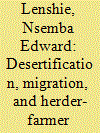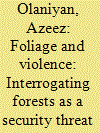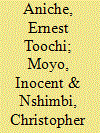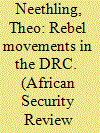|
|
|
Sort Order |
|
|
|
Items / Page
|
|
|
|
|
|
|
| Srl | Item |
| 1 |
ID:
182474


|
|
|
|
|
| Summary/Abstract |
Armed banditry is prevalent in Nigeria. It has competed with insurgency for the soul of Nigeria’s national security. Contemporary trajectories of armed banditry in Nigeria have been full of complications. One of the complications is the emergence of crime lords who engage in a self-aggrandizing but also socially sensitive criminal career. This paper seeks to explore the phenomenon of ‘crimelordism’ as a new trend in armed banditry in Nigeria. Utilizing a mixed qualitative method, the paper posits that the prevalence of grossly under-governed territorial spaces, especially in the countryside and borderlands of Nigeria, has created a vacuum of security that is being exploited by criminal kingpins to establish enclaves of criminality where they wield and exercise quasi-territorial powers. The paper submits that ‘crimelordism’ holds critical implications for Nigeria’s national security in view of its ruinous impacts.
|
|
|
|
|
|
|
|
|
|
|
|
|
|
|
|
| 2 |
ID:
181954


|
|
|
|
|
| Summary/Abstract |
While previous studies have focused on how political and economic factors fuel herder-farmer conflicts, there is a dearth of knowledge on how desertification-induced migration amidst ungoverned spaces affect herder-farmer conflicts in Nigeria. Using data from qualitative dominant mixed method, this study interrogates how desertification-induced migration and state failure to provide security governance affect herder-farmer conflicts in Nigeria. It argued that poor security governance escalates the southward migration of herders and contributes to the intensification of herder-farmer conflicts in Nigeria. These conflicts endanger livelihoods, fuel population displacements, and undermine human security. The study concludes that effective security governance amidst increased desertification in Northern Nigeria presents an opportunity for regulating southward migration of herders, mitigating herder-farmer conflicts, and promoting human security in Nigeria.
|
|
|
|
|
|
|
|
|
|
|
|
|
|
|
|
| 3 |
ID:
160221


|
|
|
|
|
| Summary/Abstract |
The discourse on security challenges in Nigeria has generated much scholarly insight. What is yet to be sufficiently interrogated is the place of forests in the problem. Situating the problem within the context of global occurrences, the study explores security threats posed by the poor management of some Nigerian forests, which has resulted in invasion and exploitation by criminals who engage in militancy, kidnapping, ritual killing, armed robbery, cattle rustling and cannabis cultivation. Using the theory of ungoverned spaces as a foundation, the study locates the major reason for the invasion and use of forested landscape for criminal activities in the Nigerian state, the presence of the authorities in these sanctuaries is either non-existent or, at best, sporadic.
|
|
|
|
|
|
|
|
|
|
|
|
|
|
|
|
| 4 |
ID:
182432


|
|
|
|
|
| Summary/Abstract |
The ‘coloniality’, porosity, and ‘ungovernability’ of borders in West Africa, have engendered undocumented migration, in which most people engage to visit their kin and for economic reasons such as herding, farming, fishing, hunting, and trading. This occurs concurrently with human smuggling, human trafficking, gun-running, terrorism, and money laundering. The rise in these cross-border criminal activities and the resultant insecurity have put irregular migration into the mainstream of political and academic conversation, generating national, regional, and global concerns. Against this backdrop, this paper examines the nexus between irregular migration and insecurity along ‘ungoverned’ borders in West Africa, based on a review of relevant literature on migration, security, and governance in scholarly journals, books as well as relevant reports, newspaper, and media accounts. The overarching question which this raises and is addressed in this paper is: How does the coloniality and porosity of ungoverned borders in West Africa engender and/or entrench cross-border insecurity? Addressing this question suggests the need to provide sufficient governance mechanisms that involve both state and non-state actors in order to reduce the ungoverned spaces in this part of Africa.
|
|
|
|
|
|
|
|
|
|
|
|
|
|
|
|
| 5 |
ID:
135230


|
|
|
|
|
| Summary/Abstract |
Despite a generally valiant effort on the part of the United Nations (UN) since 1999 to bring peace and stability to the Democratic Republic of the Congo (DRC), the country continues to be destabilised by rebel forces. These armed movements pose a constant threat to the fragile transition in the DRC, and security in the country is continuously undermined. This article examines rebel forces in the DRC from two perspectives. Firstly, it examines such movements as a manifestation of sub-national terrorism. Secondly, it examines armed movements from the perspective of so-called ‘ungoverned spaces’. The view taken in this article supports the scholarly insight and argument that in countries such as the DRC, armed movements and militias are filling power vacuums that are the result of the inability and lack of military capacity of weak states to fight these movements effectively. Specifically, the eastern and north-eastern parts of the DRC have been major conflict zones where sub-national terrorists employ terror as a strategy. In this context, the DRC is severely affected by terrorism – a phenomenon in the DRC that is intimately linked to the failure to effect sustained development and to consolidate accountable and effective governance.
|
|
|
|
|
|
|
|
|
|
|
|
|
|
|
|
|
|
|
|
|